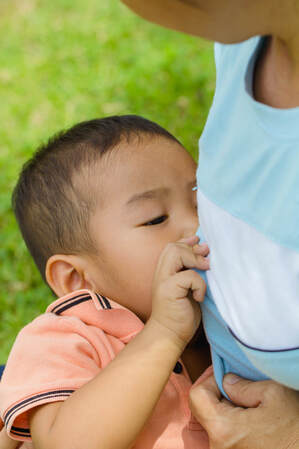RACGP Breastfeeding Policy
Breastfeeding should be promoted as the most appropriate method for feeding infants and one that offers protection against infection and some chronic diseases. General practitioners should encourage and support exclusive breastfeeding in the first 6 months, then the introduction of complementary foods and continued breastfeeding thereafter. It is recommended that breastfeeding continue until 12 months of age and thereafter as long as mutually desired.
Mothers have the right to breastfeed wherever and whenever their baby has the need.
Breastfeeding mothers in the paid work force should be supported to continue breastfeeding.
Royal Australian College of General Practitioners (RACGP)
We support this policy and offer a Lactation Consultant to support your informed decision to breastfeed.
Dale Hansson
|
FREQUENTLY ASKED QUESTIONSDo I need a referral?
No, no referral is necessary and you may be doubling up on cost as we can help with feeding difficulties even if there is no tongue-tie. Do you cut every baby that comes to you? No, definitely not. Frenotomy is a medical procedure that requires informed consent and identifying what outcome we want from the procedure is important to us. However, it is important that all costs have been explained before arriving for an appointment so there are no surprises. What age babies do you treat? We treat babies up to 12 months of age Do you treat babies who are not breastfeeding anymore? Yes we do. Many babies with ties have difficulty breastfeeding and it is not unusual for bottle-feeding and formula to be suggested ways to manage these difficulties. Unfortunately many babies still have problems feeding despite their parents buying every teat, bottle and formula recommended to them. This is because the true reason for the feeding problem has not been addressed. My baby is gaining weight so why would it help to get the tongue-tie released? Many babies with tongue-ties can feed and grow, some quite successfully. However many have other difficulties, reflux symptoms, swallowing air and difficulty with the milk flow and the vacuum. Many come on and off, cause pain and can go on to have difficulty managing solid food and drinking water. Do you require all babies to have had Vitamin K? No we don't. We keep careful statistics about bleeding post-procedure and of the less than 2% of babies that bled more than we expected, none were babies that had not received Vitamin K. Will the tongue-tie reattach? There is always a risk that the tie will grow back. The time can vary quite a bit, sometimes months after the procedure another frenulum can grow. According to our statistics, our re-snip rate is less than 1%. We recommend very gentle aftercare because when we trialled more aggressive aftercare in 2013 (as is frequently recommended by other providers) our re-snip rate doubled and both parents and babies were very distressed. If required, it is much kinder to retreat. |
What happens at a lactation consultation? We will need to ask some questions about feeding, birth and medical history, look at your baby, including the mouth, watch a breastfeed and identify if there are strategies that can improve any problems you may be having. The advantage of working within a medical centre is the proximity of skilled medical support. Even though our practice is seen as a place to treat tongue and lip-tie this is really just part of a wholistic approach to managing feeding concerns. Being able to identify if a frenulum is impacting feeding and if there is an identifiable outcome that can be achieved by treatment, cannot be separated from the consultation. The mother-infant relationship is the most important consideration. and we are happy to provide consultations on everything to do with infant feeding, not just ties. What about if I am bottle feeding? We welcome all families with feeding difficulties at Premier Health, we know that having a challenging breastfeeding experience is not always solved by bottle feeding and issues with comfortable relaxed feeding continue after weaning from the breast. We hope you will find a safe and welcoming place to help you with feeding your baby, no matter the feeding method. If there has been concern expressed about your milk supply Breastfeeding is very important for immune protection, keep breastfeeding, this is not a time to wean! It is extremely unlikely that your body cannot make enough milk for your baby but it is possible that you baby is not getting all the milk you have available or can make for a variety of reasons. Those reasons need to be explored thoroughly before considering interfering with breastfeeding. Mothers should question negative messages about their supply and seek assistance. The difficulty is finding individuals who trust breastfeeding, mothers and babies unconditionally and will respect the biological norm of the mother/baby bond. A woman who has breastfed successfully to natural term weaning is the first choice, not health professionals. |

